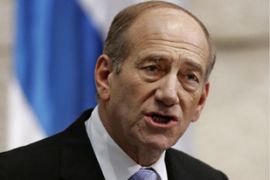Olmert trip seeks European support
Israel ready to recognise a “European role” in Arab-Israeli peace process.

Olmert will meet Angela Merkel, the German chancellor, in Berlin on Tuesday and Romano Prodi, the prime minister of Italy, on Wednesday in Rome.
‘European role’
He is also expected to talk to Italian and German leaders about a US panel’s recommendations for revising America‘s Middle East policy, as well as on developments in Lebanon, where Italian and German peacekeepers are monitoring the truce that ended Israel‘s month-long war with Hezbollah fighters.
|
“There cannot be any recognition of the Hamas government as long as this movement does not recognise Israel and does not give up its mission to destroy it” Miri Eisin, spokeswoman for Ehud Olmert |
It is Olmert’s first visit to the two countries since taking office last May. Following his meeting with Prodi, Olmert is to be received at the Vatican by Pope Benedict XVI.
Israel is ready to recognise a “European role” in reviving the peace process, dormant for six years, provided Europe continues to boycott the Hamas-led Palestinian government, said Miri Eisin, a spokeswoman for Olmert.
“Germany, Italy and Europe in general have a role to play to advance the peace process,” Eisin said. “But there cannot be any recognition of the Hamas government as long as this movement does not recognise Israel and does not give up its mission to destroy it.”
Olmert’s spokeswoman said he will ask the European heavyweights to back economic sanctions against Iran if the Islamic republic continues its nuclear programme, which Tehran says is for civilian purposes, but which the West says is a cover for atomic weapons ambitions.
Peace talks
Europe has been seeking a larger role in Middle East politics, and last month, Spain, France and Italy put forth an independent initiative meant to get peacemaking back on track. Israel rejected that plan.
The Israeli government “does not like stray peace proposals that don’t involve Israel,” Eisin said. “I’m sure that will come up.”
Olmert revived the notion of peacemaking after Palestinian rocket fire and Israel‘s summer war in Lebanon discredited his major diplomatic initiative, a large-scale West Bank pullback that was widely expected to be unilateral.
In one of the first times an Israeli official has publicly considered the plan, Amir Peretz, Israel’s defence minister, said at the Israel Business Conference that any Palestinian peace initiative must be based on the 2002 Saudi peace plan. The statement came two weeks after Olmert hinted at a major policy change.
The Saudi peace initiative calls for an Israeli withdrawal to the 1967 borders and the .
In exchange, Israel would receive peace agreements and with Arab countries.